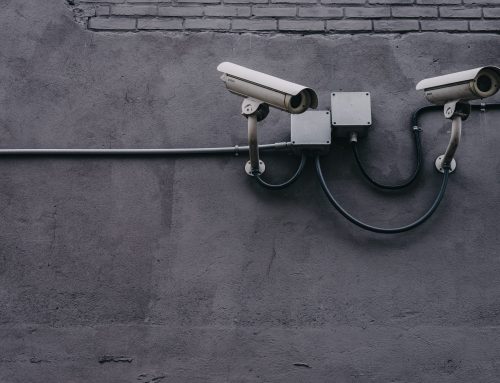What is Wiretapping?
Wiretapping is the act of monitoring, listening to, or recording communication by a third party. Wiretapping is an electronic form of eavesdropping and is often dramatized in movies and TV shows. Many of us can recall a television or film scene where a criminal divulges information, oblivious to the team of government officials or law enforcement listening in.
Wiretapping might seem to happen only in Hollywood, but everyday wiretapping can occur too. In real life, wiretapping is used by law enforcement and the government to gather evidence for a trial or to investigate crimes that are considered “dangerous to life, limb, or property.”
There are also nefarious uses of wiretapping, which is one the oldest forms of modern-day surveillance. Many people wonder, “Is wiretapping illegal?” and the short answer is, yes. Although the practice is considered illegal in the United States, there are exceptions to the rule that date back to 1928 with the Roy Olmstead v. United States case. Here is what you need to know about wiretapping.

How Does Wiretapping Work?
Wiretapping cell phones works by placing a monitoring device, also known as a “bug”, on the wire itself. This is called a bug wiretap. Cell phones can also be tapped through built-in processes, such as packet sniffers, that capture data on the network.
The word “wiretapping” dates back to the mid-1800s. The original wiretapping process began with telegraphs and involved placing an electrical tap on the telephone line. Over the years, the form and function of wiretapping has evolved alongside technology.
What is Wiretapping Used For?
In many cases, wiretapping is used to gather information without the consent of one party. The information is commonly used in criminal investigations, such as obtaining admission of guilt. Wiretapping may be used to investigate organized crime, espionage, or trafficking. In the inverse, wiretapping may also be used to evade detection or enable said activities.
How Do Police Wiretap Cell Phones?
There are numerous ways that police can wiretap cell phones. Police may implement recording malware, request that cell phone providers tap a phone, or intercept network communications.
In America, many states follow one-party consent laws. This means that law enforcement can legally intercept communications if one party consents, such as an informant. If the informant agrees to be recorded, law enforcement agents have every right to listen and record that conversation or gather information.
For law enforcement to wiretap someone they find suspicious, they must obtain a warrant. They must prove that having a wiretap warrant will help solve a serious crime, and they must have probable cause. Serious crimes include examples such as human trafficking, terrorism, and money laundering.
Law enforcement must then follow the proper procedures and requirements to get a wiretap warrant. If any step is missed or in question, the evidence obtained by wiretapping can be dismissed in court. If the warrant is granted, law enforcement can look at any wire, oral, and electronic communications for the party in question.
What is Wiretapping Law?
In the United States, wiretapping law falls under the Wiretap Act in the Electronic Communications Privacy Act, or ECPA of 1986. The Wiretap Act “protects wire, oral, and electronic communications.” This means that communications being made, in transit, or stored on devices, cannot be intercepted.
By definition, wiretapping is illegal without court approval or if consent has not been obtained by one party. There are also restrictions on what can be recorded, such as actual communications or solely metadata, and what tools can be used to do so.
Wiretapping Laws
Wiretapping laws have ebbed and flowed over the years. In the United States, the first wiretapping conviction happened in 1864. A Californian stock broker called D.C. Williams was caught surveilling corporate telegraph lines and sharing the overheard information with stock traders.
The first recorded case of wiretapping by police occurred in the 1890s when law enforcement tapped local hotels without a warrant. They were not found to breach any privacy violations since the Fourth Amendment only covered tangible communications such as mail or a physical house. Wiretapping was a known practice before that, especially among criminals and con artists, but this case kickstarted conversations about the legality of wiretapping and what constitutes good faith wiretapping by law enforcement.
Public opinion on government wiretapping intensified post-9/11. The National Security Agency was found to wiretap the cell phone devices of millions of Americans without abiding by wiretap warrant requirements. This violated the Fourth Amendment.

Privacy Laws
Generally, privacy laws relating to eavesdropping limit the use of wiretapping to warrants supported by good cause and to protect end-to-end encrypted communications. While end-to-end encryption is not foolproof, privacy laws such as the Electronic Communications Privacy Act (ECPA) can deter unauthorized communication access, which includes wiretapping.
Difference Between Active & Passive Wiretapping
The difference between active and passive wiretapping lies in the type of interception and motivation. For example, active wiretapping gains access to a system to disrupt the flow of communication, whereas passive wiretapping gathers information about the flowing data.
Can Cell Phones Be Tapped?
Yes, cell phones and landlines can be wiretapped. Physical wiretaps, such as a bug wiretap, were more common in the past. Nowadays, wiretapping through networks is the norm. This is a double-edged sword. Modern security measures, such as encryption, are effective at preventing electronic eavesdropping, but they can also disguise the presence of surveillance tools. This enables covert criminality or malicious eavesdropping to fly under the radar.
How to Tell If Your Phone is Tapped
Despite the stealthiness of modern wiretapping, some things might indicate your phone has been tapped. In the United States, a legal wiretap doesn’t necessarily result in any obvious changes to your cell phone. There may be no hidden app, hardware bumps, or physical wire. Professionals, especially those who work with sensitive information, should not be complacent about the risks of wiretapping.
So, how can you tell if your phone is tapped? First things first, if you’re on a phone call and suddenly hear a high-pitched noise, static, scratching, or beeping sounds, your phone may be tapped.
Spyware software, such as Pegasus, can double as wiretaps. Corporate espionage occurs through wiretapping, and anyone can easily purchase wiretapping software online. Some programs allow hackers to send a single text message that can activate the microphone allowing anyone to listen to your conversation.
Other programs may enter the cell phone system through a zero-day vulnerability and remain undetected on a device for months. A tell-tale sign of the presence of wiretapping software is if your cell phone suddenly loses battery or burns through an unusually high amount of data.

What to Do If Your Phone is Tapped
If you suspect your cell phone has been tapped, properly investigate these suspicions before you panic. Check for spyware, force a factory reset, contact your network provider, and immediately switch to a robust encrypted communication platform. After you’ve done all this, you may need to contact law enforcement if you suspect illicit activities are at play.
Many people reading this will want to take action and protect themselves and their companies from unwanted eavesdroppers and hackers before it’s too late. If you’re in that camp, here are a few steps you can take.
Protect Your Computers – Install a personal firewall and use a VPN, or virtual private network, to help keep the information on your computer private and secure, as well as a strong password that you frequently change. When traveling or out in public, avoid using a public Wi-Fi network that is easily accessible to hackers. Companies should ensure that their IT infrastructure has extensive security and updated software.
Know Who Has Access to Your Data – If you are a business owner with sensitive data, make sure those who have access to that data are trustworthy and you have a thorough background check conducted. Suspicious employees may need to be further investigated by a private investigator to ensure they are not wiretapping your company for secrets.
Avoid Virtual Assistants – A virtual assistant can be convenient for individuals and even major businesses. However, Amazon’s Alexa and Google Home can track your conversations and give private information to the company. These devices are always “on,” making it difficult for you to see who is listening.
Keep Your Conversations Simple – If you suspect you might be wiretapped, try to avoid discussing anything private on phones or through electronic communications such as texting and email. The less you say, the better, until you can confirm you are being wiretapped.
How Cellbusters Can Help if You’re Wiretapped
Wiretapping and other forms of illegal surveillance might seem to only happen on television, in the movies, or through the government, but that’s not the case. Cellbusters’ Zone Protector helps individuals and companies control the devices–both authorized and unauthorized–that come into their network.
Cellbusters specializes in dual-purpose cell phone detectors that detect and alert users to hidden devices. These phone tap detectors work by analyzing radiofrequency waves and detecting unusual transmission activity, such as that of a wiretap or bug wire.
Learn more about Cellbusters’ Zone Protector product today. Add maximum protection to your environment and safeguard your business.







